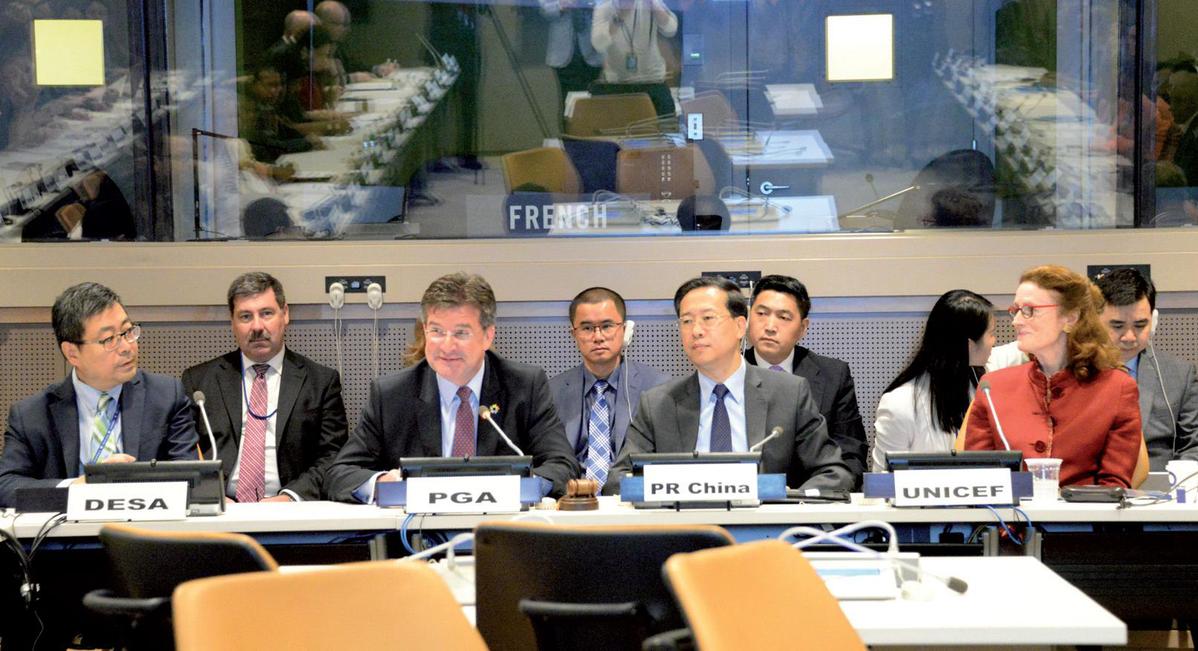UN chief praises Belt and Road Initiative


Says plan supports sustainable development, multilateralism
Miroslav Lajcak, president of the 72nd Session of the United Nations General Assembly, praised China's commitment to its Sustainable Development Goals (SDG) and multilateralism through the Belt and Road initiative (BRI).
"(BRI) is not just about financing projects in developing countries, providing improved transport routes and South-South Cooperation," Lajcak said on Wednesday.
"More than that, it represents a commitment to the SDGs, to climate action and to multilateralism," he added.
He was speaking at a high-level symposium on BRI and the 2030 Agenda for Sustainable Development at UN headquarters in New York.
Lajcak said the SDGs called for countries to establish partnerships. "China is playing its part by taking this much-needed initiative," he said.
Ma Zhaoxu, permanent representative of China to the UN, pointed out that over the past five years, more than 80 countries and international organizations have signed over 100 cooperative agreements with China.
Numerous joint projects have been implemented. Trade volume between China and the countries involved has exceeded $4 trillion and total investment has passed $60 billion.
China has opened direct flights with 43 countries along the route. Cargo trains between China and Europe have completed 7,500 trips. And 75 economic and trade cooperation zones have been set up, creating more than 200,000 jobs for local workers.
Lajcak highlighted the Asian Infrastructure Investment Bank's loan program as critical for achieving SDGs.
"In just its first year, it lent $1.73 billion to support sustainable infrastructure and other projects. It will no doubt help to close the $5 to 7 trillion gap we face in financing the SDGs," he said.
"This is not only China's development strategy, rather, it is globally rooted in cooperation, trade and geography," Lajcak added.
Lajcak reiterated that the world is in a time of super connectivity and globalization. "We are in need of a multilateral renaissance," he said, adding that multilateralism was the cornerstone of the Belt and Road Initiative.
"It shows China's commitment to its neighbors and to the principles of the United Nations," Lajcak said.
"China's economic growth is not confined within its borders," Lajcak concluded. "As a multilateral player, China is sharing its wealth and best practices through the Belt and Road Initiative."
Ma called the BRI a public good that follows international rules.
"It is a platform for cooperation that operates in line with the law of the market," Ma said.
"It is not about geopolitical rivalry. Rather than a zero-sum game, China pursues extensive consultation, joint development and shared benefits," he explained.
Ma said that while BRI was a China initiative, the opportunities and fruits that it presents belong to the whole world.
China is the world's biggest developing country, and also the second-largest economy and second-largest importer and consumer.
"While Chinese companies are reaching out to the world, China presents major opportunities to businesses around the world as a huge consumer market," he said.
Ma said in the coming five years, China will import more than $10 trillion in goods and services. "That will be a historic opportunity for foreign businesses to access the Chinese market," he added.
The symposium, organized by the Chinese permanent mission to the UN and relevant UN departments and agencies, saw the participation of close to 100 representatives from some 50 countries and organizations.

































